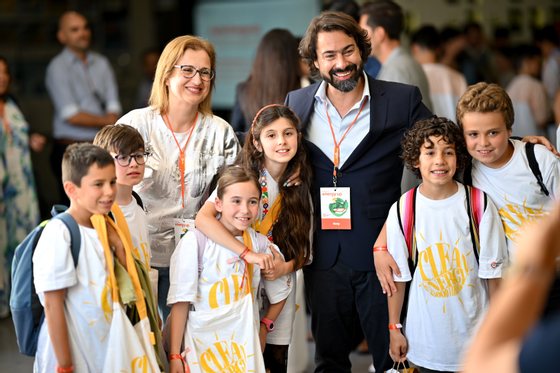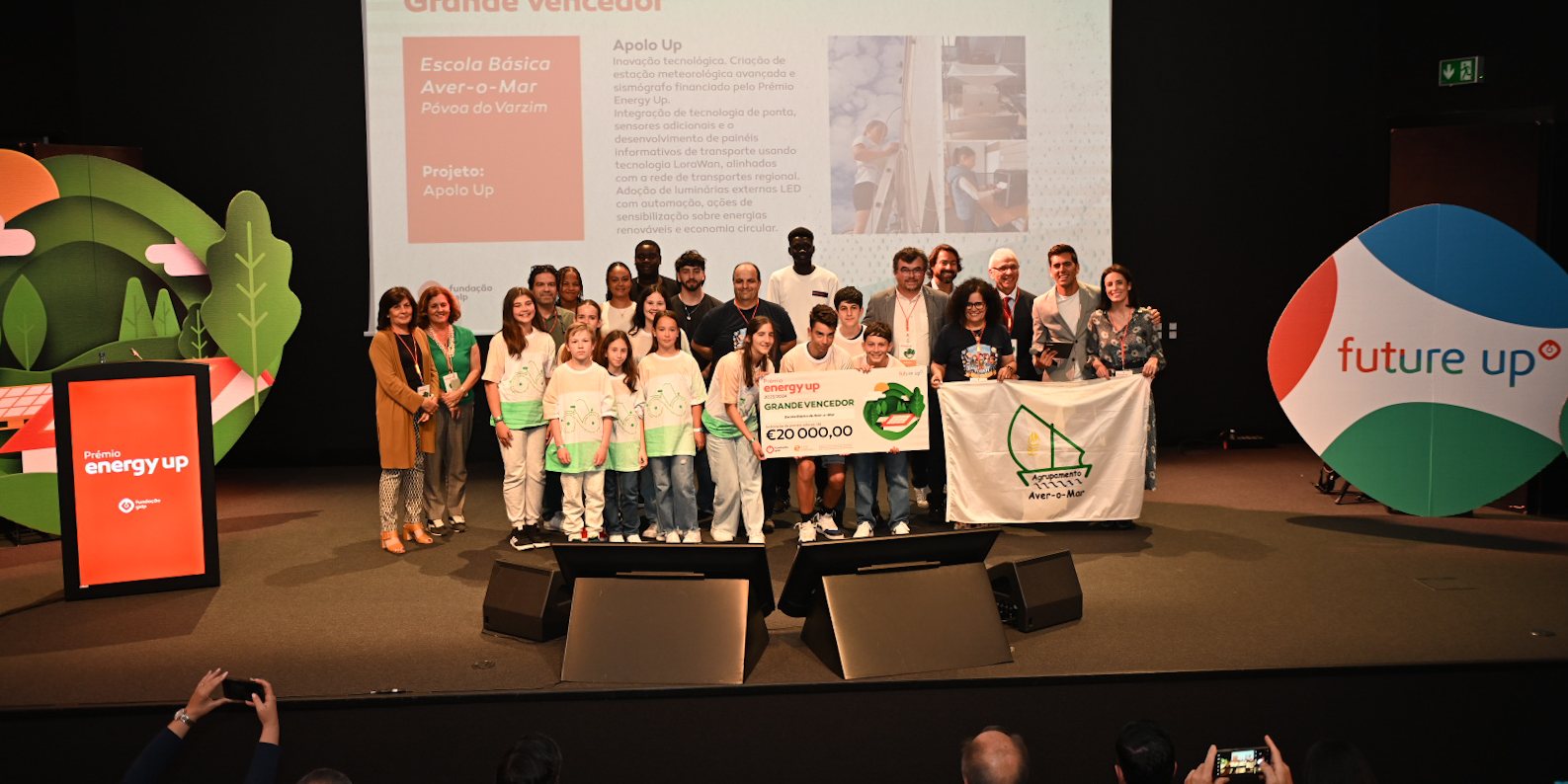One more year, a new edition of the Energy Up Award, one of the flagships of the Future Up Educational Project, through which the Galp Foundation mobilizes teachers and students for a fair, supportive and inclusive energy transition.
Among the more than 80 applications received in this 4th edition, one stood out that deserved recognition from the jury with the Energy Up Grand Prize: the Aver-o-Mar Basic School, in Póvoa do Varzim, with the “Apolo Up” project.
The winning project created an advanced meteorological station and seismograph financed with funds from the Energy Up Award and, in collaboration with the Municipality of Póvoa de Varzim and the Municipal Civil Protection, by integrating cutting-edge technology, additional sensors and the development of panels They transport information, using LoraWan technology, aligned with the regional transportation network.
The adoption of outdoor LED lights with automation, awareness-raising actions on renewable energy and the use of the circular economy are some of the purposes of this winning initiative. With the Grand Prize awarded by the jury, the school will be entitled to the installation of Galp photovoltaic panels worth up to 20,000 euros, with an estimated saving of around 10,000 euros per year on the energy bill.
In addition to the Grand Prize, the 4th edition of the Energy Up Prize also distinguished the best projects for each educational level – 1st CEB; 2nd/3rd Meeting of Chief Executives of the Board of Directors; Secondary Education/FP – with prizes of €2,000 for the 1st place and €1,000 for the finalists of each cycle.
In this 4th edition, the applications from all over the country were evaluated by a jury composed, among others, of representatives of the institutional partners of the award: ADENE (Energy Agency), APA (Portuguese Environment Agency), DGE (Directorate General of Education) and DGEG (General Directorate of Energy and Geology). Among the 10 finalist schools, the districts of Aveiro, Braga, Coimbra, Faro, Leiria, Portalegre, Porto, Setúbal and Viseu are some of those that traveled to Lisbon to find out which would be the big winner.
“The Energy Up Award has existed for 4 years and is based on rewarding schools, teachers and students who work on projects that contribute positively to the school and the local community,” explains Diogo Sousa, executive director of the Galp Foundation, and He adds: “What has happened during these 4 years? We have received dozens of projects, largely focused on sustainable mobility and energy efficiency. School projects that contribute to the community in which they are located. And at the end of the day, that’s the main goal. The second objective, and equally important, is to ensure that there is in these students a seed to learn and do. Because by doing, experimenting, testing, they follow a path of greater awareness towards sustainability and contribution to the community in which they operate.”

Since 2010, Future Up has benefited 2.2 million students and teachers from the north to the south of the country, continent and islands, and more than 21 thousand schools. Over the years, more than 5,000 Energy Up classes have been taught, in which more than 755 Galp volunteers have participated. In the 22/24 biennium, the Future Up educational program is a measure financed within the framework of the Energy Consumption Efficiency Promotion Plan, approved by the Energy Services Regulatory Authority.
Success has been a constant, but the desire is not to stop there: “The future is in each of these students. It is with everyone’s contribution that together we make a difference,” reinforces Diogo Sousa.
Ana Silveira, Director of External Relations and Communication at Galp, began the afternoon of the Awards ceremony by sharing the importance of the day celebrated. For the director, this “is an association that has a very happy result. It is an example of how it is possible to work together with the involvement of the community, municipalities, the most diverse public organizations, regulators, schools, teachers and students, all towards a better future. For us, Galp and Fundação Galp, who work with the deep conviction that education is one of the most powerful tools to accelerate the energy transition, it is very gratifying to witness the realization of the projects we design and the challenges we pose to them. the communities. , in this particular case to the school community.”
And since this has been a path full of achievements, he also shares: “The impact we are generating in the school community makes us believe in our ability to overcome the challenges we face as a society. No matter how small our actions may seem, they have a big impact when combined with the efforts of others. “Each one of you, with your ideas and projects, is doing your part for a better and more sustainable future.”
Time to award the Grand Prize
The afternoon was filled with inspiring speeches and check presentations, but the timing of the Grand Prize presentation was anticipated from the beginning. After conversations with the partners and with the students of the winners of the last edition’s Prize, the time has come to meet the big winner of 2024. The task was not easy and says Sandra Aparício, Head of Social Impact at the Galp Foundation Thus and President of the Jury: “It is an increasingly difficult time from one edition to the next. The projects we receive are increasingly extraordinary. Most of them are projects that have been developed in schools, having increasingly greater impact and integration into the community.
Therefore, the jury has a very difficult task, which is to be able to receive all the applications, analyze them and, in accordance with the criteria established by the regulations, be able to identify which ones contribute best to the fair and inclusive energy transition. actively promoting behavior change and implementing solutions in the school space and in the community. In addition to the pedagogical component, in terms of the project’s contribution to the development of students’ skills, we value projects that already have solutions implemented, developed with the support of the school and the school community, but with the active participation of the students.
And the truth is that a decision was made and it was with loud applause that the winning school was received on stage: the Aver-o-Mar Basic School, from Póvoa do Varzim, with the “Apolo Up” project.
In the words of David Sousa, General Director of the General Directorate of Education, the afternoon was successful and an “inspiring” day. The expectation I have is that these projects, in some way, spread and manage to change mentalities, they can change the responsibility that these young people will have in sustainability issues. That we have seen the enormous joy with which these children saw their projects awarded… is a way of showing the ability to intervene, to be an agent. That is what we have to encourage. Make students become intervention agents. Let them question, let them identify problems, let them work to find solutions.”
For the director, that is “the role of education. It is about being able to change mentalities, change behaviors, perceptions of the world, being more interventionist to create a better world. This Award, by working in alliance, with partners, has the virtuality of bringing several agents to collaborate on a plan that I believe is a plan to which we all have to contribute: a more sustainable planet where we can all be happier.”
Once the awards were presented, it was time to close the ceremony, with the certainty that the stage was filled with small and large agents of change and that the future, little by little – from project to project – will become more and more a reality.
Source: Observadora
